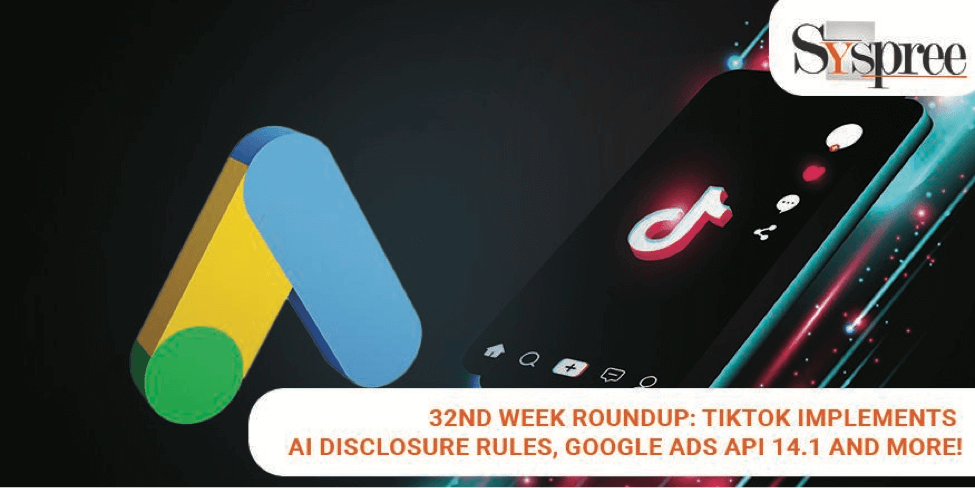Welcome to our latest roundup of the most significant developments in the digital landscape! In this issue, we offer you insight into the ever-changing world of tech, AI as well as content and marketing. From TikTok’s relentless battle against fakes created by AI to YouTube’s powerful enhancements for creators, as well as the constant evolution of Google’s Ads API this collection captures the essence of change and innovation. While the world of digital continues to change being aware of these changes in the digital landscape is more important than ever before. So let’s take a look at these compelling stories that will shape the future of digital experience.
TikTok Implements AI Disclosure Rules to Combat Deepfakes and Stay Ahead of Content Wave
TikTok has taken proactive steps against AI-generated content on social media, with new rules that require users to tag these “realistic scenes” to protect transparency and combat potential AI deepfakes. A leading social media agency reported that although TikTok updated their regulations earlier, now enforcement efforts have increased by permitting creators to activate an “AI Content Tag ” during the upload process.
ByteDance’s move follows TikTok parent company ByteDance’s implementation of AI labels on a Chinese version of TikTok; other platforms, like Instagram and YouTube, are working on AI labeling tools in response to an expected surge of AI-generated content; TikTok stands out by testing features before global launch with Chinese counterpart Douyin for early access; these measures aim at maintaining transparency by helping users distinguish authentic from AI-generated content.
Elon Musk’s Vision for AI-Powered Contextual Insights and Search Enhancement on X Platform
Elon Musk has gone beyond his ambitious plans for a multifaceted social and entertainment utility with his investments and artificial intelligence (AI) development. Musk seeks to develop AI models with “maximally truth-seeking capabilities, devoid of political bias.” This AI initiative may eventually contribute to his X platform; Musk even mentioned how semantic data matching might bolster search capacity as enhancements involving semantic matching could enhance search capacity further, allowing businesses and creators to gain deeper context when posting without simply searching keyword matches alone.
Context analysis has become central in X’s renewed effort to combat hate speech. Third-party reports suggesting an increase in hate speech mentions were countered with research undertaken by X that showed considering context decreased actual instances of actual hate speech.
Musk made clear his commitment to improving search functionality during his early tenure, with plans for semantic keyword targeting ads and improved feedback loops for improved feedback loops. Musk and his team are developing the xAI model simultaneously with these plans; it may form the backbone of future improvements, and timelines remain unknown; nevertheless, it appears integral to X’s evolution. As Musk accelerates his transformation of the platform, this could result in an enhanced X search experience in due course.
Read more: https://www.socialmediatoday.com/news/elon-musk-says-semantic-search-coming-soon-x/690058/
Google to Limit Rich Results Display, Impacting FAQ, and How-To Snippets

Google to Limit Rich Results Display Impacting FAQ and How-to Snippets
Google recently unveiled an update that will reduce rich results displayed in its search listings, specifically with respect to FAQ-rich results across search snippets and How-To-rich results exclusive for desktop devices. This global rollout should take effect within a week, with specific effects seen with regards to FAQ presentation: only authoritative government and health websites featuring this rich result being recognized; other websites no longer frequently featuring it based on automated and algorithmic eligibility being considered by Google for inclusion or exclusion in future Google updates.
Google emphasizes that site owners need not eliminate structured data, explaining that unused structured data does not adversely affect search performance but has no observable impact on search results. Regarding How-To rich results, Google highlights that they will exclusively appear for desktop users, provided the website’s mobile version incorporates the appropriate markup.
This shift could lead to a decline in clicks and traffic for sites affected by the changes. A leading SEO company in Mumbai also says that webmasters can expect to observe these alterations through shifts in their Google Search Console performance reports and analytics traffic, specifically noticeable in FAQ and How-To search appearances metrics. Despite the adjustments, these reports will remain available in Search Console.
Introducing CHERPs: A New Term for Chat Experience Result Pages in the Evolving Search Landscape
Google’s evolving digital environment highlights the need for clear distinctions between search and chat experiences, where conventional queries bring search engine results pages (SERPs), while conversational chat interactions generate text, images, videos, and ads through AI platforms generating text snippets such as those produced through artificial intelligence platforms like Chat Experience Results Pages (CHERPs).
Search Engine Land has announced they are coining “CHERPs,” Chat Experience Result Pages to address an absence of precise language to differentiate traditional SERPs from the output generated through AI chatbots produced outputs by traditional SERPs in digital transformations of this nature.
As communication needs for search and chat experiences continue to evolve, CHERPs provide transparent reporting of visibility issues related to both experiences. By acknowledging search’s ever-evolving nature and distinguishing two distinct entities coexisting within digital platforms’ complex ecosystem, this term acknowledges its evolving nature while serving to differentiate their coexistence on different digital platforms. As the digital landscape continues its steady progress, adopting both concepts offers clarity and precision when discussing generative AI-generated content discussions.
Read more: https://searchengineland.com/cherps-serps-generative-ai-search-430436
X Unveils Innovative Brand Safety Features to Bolster Advertiser Control

X Unveils Innovative Brand Safety Features
Formerly recognized as Twitter, X is currently taking strides to augment brand safety and advertiser control on its platform, aiming to protect ad positioning and reputation. Two innovative functionalities, namely Sensitivity Settings and Enhanced Blocklist, are gradually being integrated across X Ads Manager in the forthcoming weeks. The Sensitivity Settings establish an equilibrium between extensive outreach and contextual suitability, harnessing the capabilities of machine learning to equip brands with automated tools for tailoring an optimal advertising milieu.
This is achieved by regulating proximity to specific content categories based on sensitivity parameters within the dynamic balance of Sensitivity Settings. Consequently, an expanded outreach is achieved while upholding contextual appropriateness, all made possible through machine learning technology, enabling brands to exercise comprehensive authority over suitable content categories.
Enhanced Blocklist, our second innovation, provides advertisers with increased protection from unwanted keyword associations within the Home Timeline. By eliminating unsafe words like ‘You” and “Following,” advertisers can safeguard their messages against unintended contextual connections that might otherwise dilute or distort them. Linda Yaccarino, the Managing Director of X, recently spoke about how dedicated they were to brand safety by outlining recent advances made with advertiser controls and third-party collaborations.
Experts of a top social media marketing agency note that these initiatives highlight X’s dedication to providing advertisers with increased control and transparency, further solidifying its pursuit of ongoing brand safety and suitability enhancement. As brands become aware of misplaced ads’ repercussions, X’s innovative features serve as essential tools to bolster ad effectiveness while protecting brand integrity.
Read more: https://searchengineland.com/x-twitter-sensitivity-settings-enhanced-blocklist-430482
U.S. District Court Clears Google of Search Visibility Harm Allegations in Antitrust Lawsuit
During a pivotal juncture in the 2020 antitrust lawsuit initiated by the Department of Justice (DOJ) against Google, the U.S. District Court for the District of Columbia has ruled in favor of Google. The court has dismissed assertions that Google harmed its competitors by limiting search visibility. The court’s analysis determined the insufficiency of evidence supporting claims that Google curtailed competition among vertical service providers (SVPs) by constraining their presence in search outcomes and diminishing their prominence on said result pages.
While Google has emerged victorious in this legal contention, subsequent court proceedings concerning the Search Ads 360 product and agreements to establish default search engine status on mobile devices and browsers are scheduled for September 12. These proceedings will compel Google to counter allegations leveled against it by its rivals and other parties.
However, the court has yet to decide on Search Ads 360 claims. Allegations against Google regarding competition-hijacking activities, including delaying implementation of features for Microsoft Ads that might enable competition, have yet to be assessed and are therefore still under consideration by the judge. Court proceedings were necessary because any genuine dispute regarding Google’s development of Search Ads 360’s ad-buying features necessitates an official trial to reach an adjudicatory verdict.
As legal proceedings continue, this case could have serious ramifications for search marketers – particularly regarding competition between ad-buying platforms and mobile browser/phone default search engines. Google maintains its services are designed to offer superior search results while offering user assistance while remaining lawful and pro-competitive.
Google Proposes AI Content Mining with Opt-Out Option, Sparks Copyright Law Debate
Google has recently put forth an ambitious proposition to the Australian government. They propose alterations to copyright laws that would permit artificial intelligence (AI) to mine digital content, all without requiring active opt-out from publishers. In its recent submission, Google calls for modifications to copyright systems that enable equitable and extensive utilization of copyrighted material for training AI models.
This proposal also includes provisions for individuals or entities to choose exclusion if they do not wish their information to be incorporated into AI training endeavors. The potential ramifications of this proposition are substantial. Brands and publishers may confront AI-generated content closely resembling their own, potentially undermining both brand identity and the effectiveness of advertising campaigns. An opt-out mechanism reminiscent of robots.txt might offer a solution to prevent search engines from indexing their content.
Google has long championed the fair use of AI online content by AI algorithms. Still, for the first time, the company proposes an opt-out structure to answer concerns about this practice. Danielle Romain, Vice President of Trust at Google Search, emphasized how essential it was for publishers to retain control and derive value from their material while adapting to emerging AI use cases; these potential changes in copyright laws may bring with them further discussions regarding AI’s intersections with copyrighting rights and content ownership in digital environments.
Read more: https://searchengineland.com/google-content-available-ai-training-publishers-opt-out-430475
YouTube Empowers Creators with Expanded Link Display for Channel Customization

Youtube introduces Expanded Link Display
YouTube is expanding its channel customization options by rolling out an extended link listing display that enables content creators to add up to 14 external links to their channel headers, giving creators more tools than ever to drive traffic back to their sites, social profiles, or product pages. Channel owners can customize titles of links with pop-up format icons facilitating easy viewing for viewers – an update first previewed at YouTube Creator Night in May that aligns with its goal of becoming a more versatile hub for creators.
YouTube’s launch of new channel tabs, such as “Courses” for educational content and “Releases”, where musicians can showcase their latest tracks, furthers its goal to facilitate diverse content experiences. Experts of a top social media marketing agency will tell you that by expanding external linking capabilities for creators and providing them with greater growth assistance instead of isolating various aspects of creation, YouTube hopes to strengthen creator appeal while broadening value proposition, increasing user engagement while broadening creator value proposition. All users will soon have access to this extended link display by August 23rd.
Google Ads API Version 14.1 Unveiled: Enhanced Features and Performance Insights
Google unveiled version 14.1 of their Ads API less than two months after first unveiling version 14. This incremental update introduces various tools and features designed to empower advertisers by improving campaign monitoring capabilities, data-driven decision-making processes, and more effective campaign oversight capabilities. One notable improvement of Google Ads API version 14.1 is supplementary search term data that gives advertisers more insights into campaign performance.
Additionally, Google plans to provide advertisers with new recommendation types and enhanced account management support as part of this update – helping advertisers leverage data insights more efficiently with campaign optimizations based on client libraries/code updates they will release next week for seamless adoption of all its new features.
Google Ads API version 14.1 brings several upgrades across several areas, such as account management, assets, billing, campaigns, criteria experiments, and reports reporting shopping. A leading SEO company in Mumbai will tell you that Google continues to empower advertisers with tools designed to refine advertising strategies and maximize campaign performance; as the digital advertising landscape shifts, Google offers these advancements to aid advertisers navigate evolving digital advertising environment with enhanced campaign management capabilities that use rich data insights for informed decision-making capabilities.
Read more: https://searchengineland.com/google-ads-api-version-14-1-430570
Conclusion of the Roundup
Digital technology continues to transform, with recent advancements across major platforms significantly impacting content production, AI use, and advertising revenue streams. TikTok’s measures to combat deepfakes with AI disclosure rules underscore its dedication to transparency and content integrity. At the same time, YouTube’s increased support of external link options for creators strengthens its role as an information hub that offers a comprehensive online presence for creators.
Google Ads API version 14.1 offers advertisers improved performance insights and tools, reflecting Google’s commitment to data-driven decision-making. As these platforms innovate and adapt accordingly, they further demonstrate how essential it is to stay attuned to dynamic shifts within digital environments. If you like this blog check out our previous blog 31st Week Roundup: X Revenue Sharing, Microsoft Code-Free Conversions, and More!







